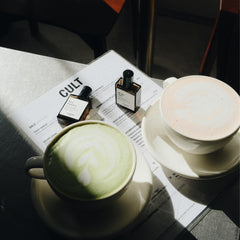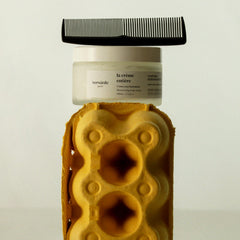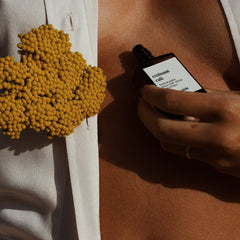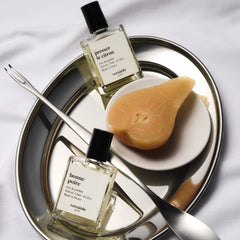For years, brand statements have been oriented towards a " 100% natural, 100% eco-responsible, 100% green / clean, 100% vegan, 100% cruelty free... ". and " Synthesis is too chemical, too harmful, not eco-responsible enough, not qualitative enough " approach
With all these mentions and consumer apprehensions: it is difficult to find your way around.
We swear to tell the truth, nothing but the truth : let's lift the veil on certain received ideas!
SHOULD WE START OVER ?
1. Synthesis has no place in perfumery
Wrong !
Synthesis appeared at the end of the 19th century and marked the beginning of modern perfumery. At the risk of shattering a myth, all the greatest perfumes from the most prestigious luxury houses owe their success to original accords: caramel, lily of the valley, peach, aldehydes, pear...
Most of the flowers and almost all of the fruits (except citrus) are synthetic. These notes are 'mute': either the scent doesn't exist, or their scents cannot be extracted naturally.
Synthetic accords therefore have to be created, expanding the perfumer's palette and giving him greater creativity and freedom (around 300 natural notes VS over 4,000 synthetic notes).
2. Natural = Green
Wrong !
Ouch, vast subject that often divides...
A product can be natural and eco-responsible, but the two are not automatically linked ! To date, there is no 100% eco-responsible perfume.
Here are the three reasons:
- The carbon impact - ingredients (eg Patchouli from Indonesia or Vanilla from Madagascar) which are sourced from all over the world and repatriated by air, river... and not by carrier pigeons.
- Yield - 3.5 tons of rose petals to produce 1.5 kg of essence or 600 kg to create 1 kg of Rose absolute.
- The packaging - To be 100% eco-responsible, the packaging should be: upcycled / recycled, refillable, recyclable, without cellophane, without plastic lamination above the labels, without plastic cover / dip tube, without plastic insert in wooden/cork caps, printing without ink, without tissue paper to wrap the bottles... "Less is more" becomes a little "Less is nothing"
- BONUS - The mentions "BIO Label" and "Ethical Partnerships" are to be taken with a grain of salt: ORGANIC from India has nothing to do with ORGANIC Made in France. Regarding ethical partnerships, the French SMIC is far from being universal, that's it.
The synthesis is to want to preserve our ecosystems like our animal friends (Ambergris, Civet, Chevrotin Musk, Castoreum) which for many centuries were killed and used for their very characteristic smells. Today, materials of animal origin are prohibited. Thanks to the synthesis, we were able to obtain notes close / similar to those disappeared / prohibited.
3. Natural always smells good
Wrong !
When we talk about natural notes, we think of the Rose and Jasmine harvests in Grasse, where the smell of the petals leaves a delicate wake in our nostrils.
Did you know that many natural products do not have the smells that we are used to smelling in perfumery or at the florist?
- The Rose smells of artichoke, geranium, far from the morning dew!
- Jasmine has a medicinal, animal and very spicy smell, far from solar monoï!
4. Natural stays better on the skin
Wrong !
The natural enhances the soul of a perfume. It is true that the natural raw materials used in perfumery are often of very good quality, they make it possible to give a beautiful evolution to a perfume.
On the other hand, a 100% natural perfume will hold little on the skin.
Why?
- Most natural notes are very volatile (example: Citrus - Citrus) and evaporate very quickly on the skin
- Nature is alive, it evolves and changes, natural materials too
- Certain synthetic notes such as Musks are excellent fixers and diffusers. By integrating them into the formulas, this increases the sillage and the hold of the perfume on the skin.
5. Synthesis is cheap
Wrong !
Another cliché and a lack of transparency vis-à-vis the consumer.
Yes, the natural can be very expensive (several thousand euros for Bois de Oud, Iris, Rose etc...) when the yield is low: the Iris requires about 6 years to grow from the ground, in the laboratory. It is one of the rarest and most expensive raw materials in perfumery.
Conversely, as soon as the yield is sufficient, the price per kilo drops. Orange, Lavender cost around 10€ / Kg, nothing to break the bank!
Synthetic is indeed cheaper than natural, this is one of the main reasons why brands often use it.
Be careful, not all summary notes are "cheap". Ambroxan for example, is a note costing around 600€ / Kg.
Our perfumes combine the natural and the synthetic and yet, without being in excess of one or the other, our formula prices are between 300 and 600€ / Kg HT (VS 80€ / Kg on average) .
6. Focusing its entire concept on vegan / cruelty free
It's a good booby trap!
Vegan: doesn't contain ingredients of animal origin
Actually, pretty much all the ingredients of animal origin have disappeared. Musks, animal notes etc. have been banned for years. We sometimes find brands using honey, that said, the exploitation of honey does not represent a threat on the environment or animal abuse.
Therefore, almost all cosmetic brands are vegan.
Cruelty free: not tested on animals (poor things !)
Actually, since 2004 (it's been 18 years anyway), it is forbidden to carry out cosmetic tests on animals in the European Union.
In short yes it's good to be a vegan and not tested on animals brand but to basing their concept and its value proposition on that, no, they fool you.








2 comments
Thank you for sharing this truly valuable information. I’m amazed that one brand can be so open-minded, creative, talented, and unique, while still being affordable. It’s hard to believe, but Versatile really manages to achieve all of that.
Hello, I hope you’re well. Such an interesting read, far from the carbon copy texts of major companies ( & some niche ones too) I like your ethos, it’s definitely a refreshing change from the ‘usual’ I see so much of your hard work is from a personal place, which gives your perfumes a unique character. I’m looking forward to trying the sample box, to see which one ( or perhaps 2 or 3) spark my fire. Kind Regards, James.